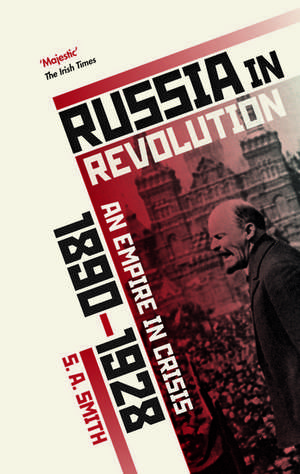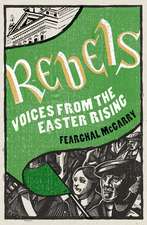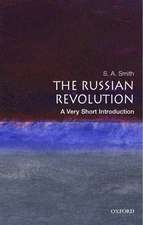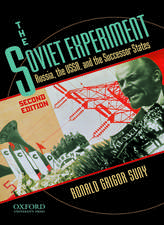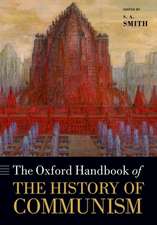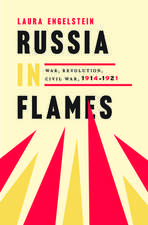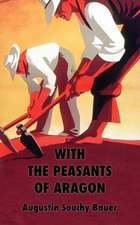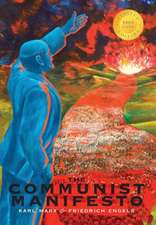Russia in Revolution: An Empire in Crisis, 1890 to 1928
Autor S. a. Smithen Limba Engleză Paperback – 12 iul 2018
| Toate formatele și edițiile | Preț | Express |
|---|---|---|
| Paperback (1) | 83.61 lei 10-17 zile | +35.07 lei 7-13 zile |
| OUP OXFORD – 12 iul 2018 | 83.61 lei 10-17 zile | +35.07 lei 7-13 zile |
| Hardback (1) | 156.75 lei 31-38 zile | |
| OUP OXFORD – 26 ian 2017 | 156.75 lei 31-38 zile |
Preț: 83.61 lei
Preț vechi: 97.39 lei
-14% Nou
Puncte Express: 125
Preț estimativ în valută:
15.100€ • 16.70$ • 13.24£
15.100€ • 16.70$ • 13.24£
Carte disponibilă
Livrare economică 03-10 martie
Livrare express 28 februarie-06 martie pentru 45.06 lei
Preluare comenzi: 021 569.72.76
Specificații
ISBN-13: 9780198734833
ISBN-10: 0198734832
Pagini: 480
Ilustrații: 20 black & white illustrations. 3 maps
Dimensiuni: 135 x 215 x 35 mm
Greutate: 0.52 kg
Editura: OUP OXFORD
Colecția OUP Oxford
Locul publicării:Oxford, United Kingdom
ISBN-10: 0198734832
Pagini: 480
Ilustrații: 20 black & white illustrations. 3 maps
Dimensiuni: 135 x 215 x 35 mm
Greutate: 0.52 kg
Editura: OUP OXFORD
Colecția OUP Oxford
Locul publicării:Oxford, United Kingdom
Recenzii
Summing Up: Essential. All public and academic levels/libraries.
Saturated with statistics and comparisons with the Chinese experience, Smiths volume is an excellent summary of the deep cultural and socio-economic causes and continuities of the revolutions of 1917.
Smith's book is an ideal introduction to the history of the Russian Revolution, but it is more than that. A century after the events it describes, it is an indication that scholarship on the subject has matured, and that the Russia Revolution can be studied as objectively as any other episode in modern European history. The significance of Smith's work ought to be that it sets the tone for all future writing on the subject.
Smith's Russia in Revolution is an authoritative view of a seismic event, but also much more. By covering nearly thirty years from 1890, he illuminates what Franco Venturi called the roots of revolution, profiling the creation of a revolutionary generation as well as the fall-out of the 1920s: he also deals in detail with the civil wars that followed 1917. The result is a panoramic view of an upheaval which was cultural and economic as well as political; like Raymond Carrs history of modern Spain, it far transcends the limitations of a 'general history.' Above all it shows, impartially and decisively, both why the revolution failed to deliver its promises, and why it happened in the first place.
A thorough study.
Among the best one-volume introductions to not only the history of the revolution but also of late tsarism, the Civil War (1918-21), and the years of the New Economic Policy.
...a major milestone in the international debates on the revolution... Smith's brilliant work will be invaluable for students of history, both in Russia and abroad, and for all those interested in global history in general and the Russian Revolution in particular.
Well-researched, extremely balanced, nicely nuanced, and very readable.
The most expansive history of the 1917 revolution available... Smith fairly and intelligently arbitrates the great debates among historians over how to interpret the revolution.
In what is the most assured general history yet to appear, Smith uses his deep knowledge of 20th-century Russia to place the upheavals in their larger social and historical contexts.
Laudable.
A useful overview... fair and balanced... Book of the month.
I can think of no better overview of the period written in recent years ... No one in Britain is better equipped to write about 1917 than Robert Service and Stephen Smith. Both men have devoted most of their scholarly lives to studying the revolution. They bring to their current works not just vast knowledge but also a deep commitment to balanced judgment, intellectual rigour and honesty, and accessible writing.
A well-proportioned and skilfully condensed panorama of the revolutionary situation in the Russian empire and its aftermath, covering nearly 40 years
an ideal introduction to the deep roots of the revolution, its unfolding and long aftermath
[A] sober, well-researched and comprehensive history ... Even-handedness is the hallmark of Smith's solid and authoritative book
Easily digestible ... It is one of Russia in Revolution's merits that the author lays out the scope of contending interpretations and leaves it to his readers to make up their own minds.
SA Smith's majestic book sets the overthrow of Tsar Nicholas and the Bolshevik revolution in context [... and] skilfully reconstructs the cultural and socioeconomic context of 1917
Fluently written and convincingly argued
A challenging revisionist history reassessing the ongoing significance of the Russian Revolution Smith's work will be declared a subject standard, sure to stand out for its stellar research.
Readers looking for an introduction to the deep roots of the revolution, its proximate causes and aftermath are well served by S.A. Smith's Russia in Revolution.
A master historian of the Russian Revolution, S.A. Smith has wrestled the events and personalities, policies and mass politics of the years 1890 to 1928 into a coherent and compelling story of the entrance of ordinary people onto the stage of history and the brutal, violent descent of Russia into dictatorship. Smith explains better than anyone else how a revolution marked by radical democracy and hope for social justice sacrificed many of its ideals to win and hold power and inspire an international movement against capitalism and imperialism.
Saturated with statistics and comparisons with the Chinese experience, Smiths volume is an excellent summary of the deep cultural and socio-economic causes and continuities of the revolutions of 1917.
Smith's book is an ideal introduction to the history of the Russian Revolution, but it is more than that. A century after the events it describes, it is an indication that scholarship on the subject has matured, and that the Russia Revolution can be studied as objectively as any other episode in modern European history. The significance of Smith's work ought to be that it sets the tone for all future writing on the subject.
Smith's Russia in Revolution is an authoritative view of a seismic event, but also much more. By covering nearly thirty years from 1890, he illuminates what Franco Venturi called the roots of revolution, profiling the creation of a revolutionary generation as well as the fall-out of the 1920s: he also deals in detail with the civil wars that followed 1917. The result is a panoramic view of an upheaval which was cultural and economic as well as political; like Raymond Carrs history of modern Spain, it far transcends the limitations of a 'general history.' Above all it shows, impartially and decisively, both why the revolution failed to deliver its promises, and why it happened in the first place.
A thorough study.
Among the best one-volume introductions to not only the history of the revolution but also of late tsarism, the Civil War (1918-21), and the years of the New Economic Policy.
...a major milestone in the international debates on the revolution... Smith's brilliant work will be invaluable for students of history, both in Russia and abroad, and for all those interested in global history in general and the Russian Revolution in particular.
Well-researched, extremely balanced, nicely nuanced, and very readable.
The most expansive history of the 1917 revolution available... Smith fairly and intelligently arbitrates the great debates among historians over how to interpret the revolution.
In what is the most assured general history yet to appear, Smith uses his deep knowledge of 20th-century Russia to place the upheavals in their larger social and historical contexts.
Laudable.
A useful overview... fair and balanced... Book of the month.
I can think of no better overview of the period written in recent years ... No one in Britain is better equipped to write about 1917 than Robert Service and Stephen Smith. Both men have devoted most of their scholarly lives to studying the revolution. They bring to their current works not just vast knowledge but also a deep commitment to balanced judgment, intellectual rigour and honesty, and accessible writing.
A well-proportioned and skilfully condensed panorama of the revolutionary situation in the Russian empire and its aftermath, covering nearly 40 years
an ideal introduction to the deep roots of the revolution, its unfolding and long aftermath
[A] sober, well-researched and comprehensive history ... Even-handedness is the hallmark of Smith's solid and authoritative book
Easily digestible ... It is one of Russia in Revolution's merits that the author lays out the scope of contending interpretations and leaves it to his readers to make up their own minds.
SA Smith's majestic book sets the overthrow of Tsar Nicholas and the Bolshevik revolution in context [... and] skilfully reconstructs the cultural and socioeconomic context of 1917
Fluently written and convincingly argued
A challenging revisionist history reassessing the ongoing significance of the Russian Revolution Smith's work will be declared a subject standard, sure to stand out for its stellar research.
Readers looking for an introduction to the deep roots of the revolution, its proximate causes and aftermath are well served by S.A. Smith's Russia in Revolution.
A master historian of the Russian Revolution, S.A. Smith has wrestled the events and personalities, policies and mass politics of the years 1890 to 1928 into a coherent and compelling story of the entrance of ordinary people onto the stage of history and the brutal, violent descent of Russia into dictatorship. Smith explains better than anyone else how a revolution marked by radical democracy and hope for social justice sacrificed many of its ideals to win and hold power and inspire an international movement against capitalism and imperialism.
Notă biografică
S. A. Smith is a historian of modern Russia and China, who was a graduate student at both Moscow State University and at Peking University. He is the author of many books and articles on the Russian and Chinese revolutions, including Red Petrograd: Revolution in the Factories, 1917-18 (CUP, 1983) and Revolution and the People in Russia and China: A Comparative History (CUP, 2008), and is editor of The Oxford Handbook of the History of Communism (OUP, 2014). He taught for many years at the University of Essex, where he is an honorary professor, and then at the European University Institute in Florence, before being elected to a senior research fellowship at All Souls College, Oxford, in 2012.
